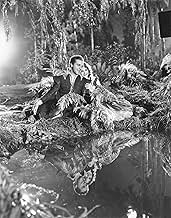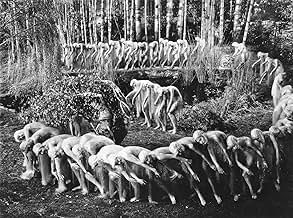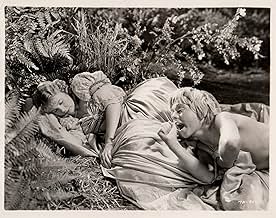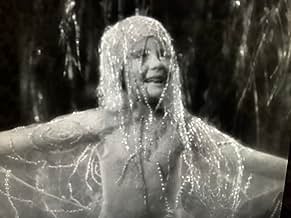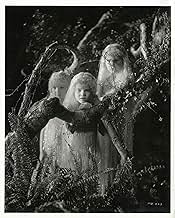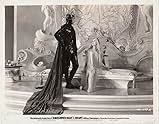AVALIAÇÃO DA IMDb
6,8/10
4,1 mil
SUA AVALIAÇÃO
Adicionar um enredo no seu idiomaTwo couples and a troupe of actors have an encounter with some mischievous fairies in the forest.Two couples and a troupe of actors have an encounter with some mischievous fairies in the forest.Two couples and a troupe of actors have an encounter with some mischievous fairies in the forest.
- Direção
- Roteiristas
- Artistas
- Ganhou 2 Oscars
- 6 vitórias e 2 indicações no total
Olivia de Havilland
- Hermia - In Love with Lysander
- (as Olivia de Haviland)
Nini Theilade
- Fairie - Attending Titania
- (as Nina Theilade)
- Direção
- Roteiristas
- Elenco e equipe completos
- Produção, bilheteria e muito mais no IMDbPro
Avaliações em destaque
The movie is dated, true. In fact, seeing 30's Hollywood's version of Shakespearian England's version of Athenian costuming is a delight in itself. But the actors in this rendition are just amazing. Not only is the cast impressive (Cagney, Brown, Rooney, D'Havilland, Powell), but they are doing the roles with the right mixture of buffoonery and dedication to Shakespeare's love of high and low comedy together.
The casting of Cagney as Bottom was brilliant, his mixture of swagger and obliviousness is perfect, especially when played off of the great Joe E. Brown, who's rubber faced quiet performance is uproarious. Young Mickey Rooney is a wonderful puck, light and athletic, it may be his finest work. The special effects manage to give off the feeling of faerie, without overpowering what is going on. And the weaving of the two stories together works as well as might be hoped for.
I consider this to be the classic definitive Midsummer's Night Dream films. No other can ever measure up.
The casting of Cagney as Bottom was brilliant, his mixture of swagger and obliviousness is perfect, especially when played off of the great Joe E. Brown, who's rubber faced quiet performance is uproarious. Young Mickey Rooney is a wonderful puck, light and athletic, it may be his finest work. The special effects manage to give off the feeling of faerie, without overpowering what is going on. And the weaving of the two stories together works as well as might be hoped for.
I consider this to be the classic definitive Midsummer's Night Dream films. No other can ever measure up.
Early Hollywood wasn't known for its high-brow culture, and this film was an important step in enriching the cinema. The opening titles reveal how proud Warner Brothers were to have done it, and what a production it was indeed: all the top Warner's stars, the best technical support in the world, a top composer of the day in Erich Korngold, ballet choreography by Nijinska, and the highly respected Max Reinhardt as director. You couldn't have asked for more in those energetic movie days.
And, happily, it works! It's still beautiful, exciting, technically enthralling--and very funny! There are too many great performances to single out even one; but as an ensemble, the "players" are marvelous. No one seems stilted; everyone is right at home; even though most of these individuals hadn't been trained to the classical stage--they were just good! and, incidentally, it just goes to show the timelessness of the play itself.
Some scenes today seem overlong, and I think someone should have toned down little Mickey Rooney a good bit, but all in all it's a triumph. Midsummer or not, it's a sweet interlude.
And, happily, it works! It's still beautiful, exciting, technically enthralling--and very funny! There are too many great performances to single out even one; but as an ensemble, the "players" are marvelous. No one seems stilted; everyone is right at home; even though most of these individuals hadn't been trained to the classical stage--they were just good! and, incidentally, it just goes to show the timelessness of the play itself.
Some scenes today seem overlong, and I think someone should have toned down little Mickey Rooney a good bit, but all in all it's a triumph. Midsummer or not, it's a sweet interlude.
While the 1999 version is receiving mixed reviews, this classic version with a star-studded cast is delightfully mischievous. Mickey Rooney, a very young boy, has never been better cast, nor delivered a better performance. And despite the dream sequences not always being clearly distinguished from real time motion, one catches on quickly enough. Everyone, even Dick Powell, delivers his lines mellifluously, something that cannot be said for the 1999 version. There's more energy and zeal, more mystery and charm, more color(though B&W) and clarity, despite its age. Remarkable performances under exellent direction work together to make the Bard sparkle, and the film enchant.
10artzau
Thalberg's pledge to give back to the people something good is seen in this project realized 66 years ago. Everyone is acting! No one struts or swains, dying to be a star. The young, superlovely Olivia de Havilland is a gorgeous and fun Hermia in her maiden role. Dick Powell and Ross Alexander as the two Athenian youths confused by Puckish Mickey Rooney Robin Goodfellow are wonderful in their entanglement with beautiful Jean Muir's Helena. The players, Frank McHugh, Dewey Robinson, Hugh Herbert, Grant Mitchell and the wonderful snob's snob, Arthur Treacher are topped by Jimmy ("you dirty rat") Cagney [trivia buffs know he never said those lines except in response to Gorshen and Rich Little's impressions of him at a roast before his death] and Joe E. Brown's Flute. Victor Jory, often cast as a villain is great as Oberon, as is lovely Anita Louise as Titania. There's not a weak spot in this cast and the entire play, in living Black and White, is soft, diffused and whispery as a summer night. Erich W. Korngold's music is supplemented by the exquisite Mendelssohn score and look for a tiny Billy Barty as Mustardseed, one of the sprites. There are other fine ones, the RSC's 1968 and the recent 1999 are wonderful, but, fans, take it from an old Shakespeare buff, this one is an immortal production.
Though another commentator disagrees, if Rooney is not the greatest Puck you've ever seen, then tell me who is. With all respect to a talented actor, the sad part is that he played his greatest role when he was, what, 14?
The greatest Shakespeare movie of all time, in my opinion. The dazzling cinematography for its age. The fact that they got the mostly American actors to speak the lines properly. That inspired scene with a fairy jazz band. The special "star spangled" effect.
The criticism that scenes are overly long is related to a more modern perception of how long a scene should be, and alas, Shakespeare is mostly unmercifully cut (look at Olivier's last "King Lear"--Branaghs "Hamlet" would be an exception). Shakespeare just wrote long scenes. You woulnd't have Juliet on the balcony just say "I love you, Romeo," and disappear.
The greatest Shakespeare movie of all time, in my opinion. The dazzling cinematography for its age. The fact that they got the mostly American actors to speak the lines properly. That inspired scene with a fairy jazz band. The special "star spangled" effect.
The criticism that scenes are overly long is related to a more modern perception of how long a scene should be, and alas, Shakespeare is mostly unmercifully cut (look at Olivier's last "King Lear"--Branaghs "Hamlet" would be an exception). Shakespeare just wrote long scenes. You woulnd't have Juliet on the balcony just say "I love you, Romeo," and disappear.
Você sabia?
- CuriosidadesWhen the forest that Max Reinhardt designed could not be lit properly, cinematographer Hal Mohr thinned the trees slightly, sprayed them with aluminum paint and covered them with cobwebs and tiny metal particles to reflect the light. As a result, he became the first (and only) write-in winner of an Academy Award.
- Erros de gravaçãoCorrective lenses were introduced in the 13th century so they could have been worn in Shakespeare's time.
- Citações
Hermia, in Love with Lysander: [to Helena] How low am I, you painted maypole? Speak! How low am I? I am not yet so low but that my nails can reach into your eyes!
- Cenas durante ou pós-créditosThe opening credits appear as if they were "trickling down" from the top of the screen.
- Versões alternativasThe original 132-minute roadshow version of this film has been restored, shown on cable, and issued on videocassette and DVD. For many years, though, this film was shown only in its general release version, a 117-minute version painstakingly edited by the studio (so that the cuts would not be noticeable), which shifted the order of some sequences and eliminated others.The 2007 DVD release also restores the Intermission title card, not seen since the film's original roadshow release in 1935, as well as including the overture and exit music.
- ConexõesFeatured in A Dream Comes True (1935)
- Trilhas sonorasA Midsummer Night's Dream: Overture and Incidental Music
(1826) (uncredited)
Music by Felix Mendelssohn
Adapted by Erich Wolfgang Korngold
Heard throughout the film
Principais escolhas
Faça login para avaliar e ver a lista de recomendações personalizadas
- How long is A Midsummer Night's Dream?Fornecido pela Alexa
Detalhes
- Data de lançamento
- País de origem
- Central de atendimento oficial
- Idioma
- Também conhecido como
- A Midsummer Night's Dream
- Locações de filme
- Empresas de produção
- Consulte mais créditos da empresa na IMDbPro
Bilheteria
- Faturamento bruto mundial
- US$ 2.616.000
- Tempo de duração2 horas 13 minutos
- Cor
- Mixagem de som
- Proporção
- 1.37 : 1
Contribua para esta página
Sugerir uma alteração ou adicionar conteúdo ausente

Principal brecha
By what name was Sonho de uma Noite de Verão (1935) officially released in India in English?
Responda

